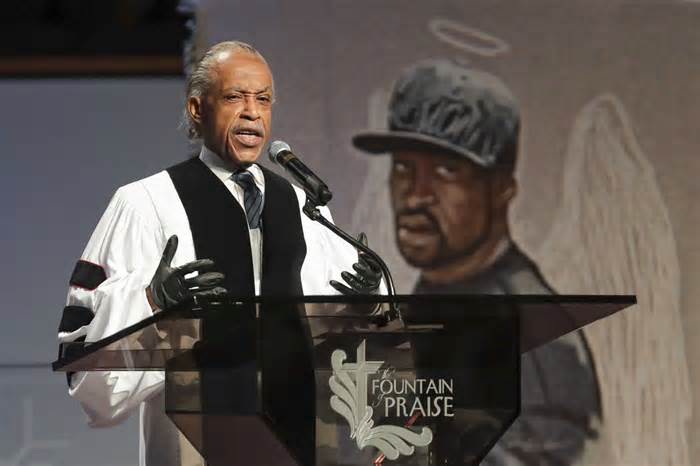WASHINGTON (AP) – Amid protests and riots over the police killings of black Americans, a national commemoration of the 1963 Civil Rights March in Washington is being reconfigured to comply with coronavirus protocols in the District of Columbia.
Although many protesters will arrive by charter bus from surrounding communities on August 28, Reverend Al Sharpton, one of the organizers, will ask some to sign up for planned satellite marches in states that are considered hot spots for COVID-19.
“We stick to protocol,” Sharpton told The Associated Press in an exclusive interview. “The purpose is not to know how many thousands of other people there will be (in Washington). It’s going to be a smart crowd.”
The commemoration, which will take place on the 57th anniversary of the “I Have a Dream” speech through the Rev. Martin Luther King, Jr., will begin with a rally at the Lincoln Memorial. Martin Luther King III, son of the late civil rights icon, attorney Benjamin Crump and the families of George Floyd, Trayvon Martin, Eric Garner, Ahmaud Arbery and Breonna Taylor, are expected to attend Washington.
After the memorial meeting, participants in Washington will march to the Martin Luther King, Jr. Memorial in West Potomac Park, to the National Mall, and then disperse.
All participants must wear masks, Sharpton said. Organisers will also provide hand sanitizer stations and perform temperature checks during the event.
“The purpose is to put on a platform, in the shadow of Abe Lincoln, the families of other people that Array … have lost those who enjoyed out-of-control racial bias,” Sharpton said. “On those steps, Dr. King talked about his dream, and the dream didn’t come true. This is Exhibit A of this breach.”
The revised plan appears to be a potentially sensitive confrontation with the government of Washington Mayor Muriel Bowser over COVID-19 restrictions on the nation’s capital. Last July, as the number of local infections increased, Bowser ordered anyone traveling or returning to Washington from a virus access point to be quarantined for 14 days. The list is reviewed every two weeks and the recent maximum list, published on August 10, ranks 29 states as hot spots.
Bowser, when asked about the possible confrontation on July 30, said that government officials had contacted the march’s organizers and that Washington would not approve its virus regulations for participants.
“They are aware of all the local instructions that may just be their planning,” he said. “If there are other people from jurisdictions on this list, they deserve to be quarantined.”
On August 28, he has already won a permit from the National Park Service. Operating under a permit application filed through the Reverend Mark Thompson, the original application estimates that 100,000 participants are involved. NPS spokesman Mike Litterst said his firm is discussing COVID-19 mitigation plans with organizers, but that compliance with local virus restrictions “is not a permit requirement or condition.”
Sharpton civil rights group, the National Action Network, is running with local chapters to host commemorations in Kentucky, South Carolina and Texas, where giant outdoor screens will broadcast the rally live in Washington. All those states are on the Washington hot spot list lately.
The NAACP, one of the many partners in this year’s commemoration, last week hosted a virtual march on Washington. The site will live stream the Washington March, as well as other systems before and after the event.
The Black Lives Movement, a coalition of more than 150 black-led organizations that make up the broader Black Lives Matter movement, will hold its Black Virtual National Convention later in the evening. Organizers said their conference would coincide with the presentation of a new political calendar to take advantage of the good luck of this summer’s BLM themed events, which called for the elimination of police investment for investments in physical care, education, housing and other social activities. Services. black communities.
Sharpton first announced plans for the commemoration at a memorial service in June in Minneapolis for Floyd, a black guy whose death at the hands of police galvanized national protests opposed to police brutality and systemic racism. The theme of the march – “Get Your Knee Off Your Neck” – is a chorus of Sharpton’s praise for Floyd, who died on May 25 after a white police officer held his knee around Floyd’s neck.
The civil rights leader called on participants from other states to march at the desks of his U.S. senators, calling for reforms to the federal police. Sharpton said protesters also deserve to seek protections from the revitalized American electorate reminiscent of Congressman John Lewis, who until his death on July 17 was the last live speaker at the first march in Washington for Jobs and Freedom in 1963.
In June, the Democratic-led House of Representatives passed the George Floyd Police Justice Act, which would prohibit the use of police maneuvers and end qualified immunity for officers, among other reforms.
In July, after Lewis’s death, Democratic senators reinstated a law that would repair a provision of the landmark Election Rights Act of 1965, which was eviscerated through the U.S. Supreme Court in 2013. The law in the past required states with a history of electoral repression to seek federal authorization before converting voting rules.
Both measures act in the Republican-controlled Senate.
“Everyone is looking to move from protest to reconciliation without legislation,” Sharpton said. “If we don’t have the legislation, we’re going to come back here.”
___
Morrison reported from New York and is a member of the AP Race and Ethnicity team. Follow him on Twitter: https://www.twitter.com/aaronlmorrison.

